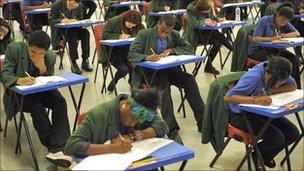Ofsted inspections to scrutinise teaching quality
- Published

Outstanding schools will no longer face routine inspections, and weaker schools face more attention
School inspections in England will give more scrutiny to the quality of teaching, in a back to basics shake-up by the Ofsted education watchdog.
A new streamlined inspection framework will emphasise four key areas - pupil achievement, teaching standards, behaviour and school leadership.
Parents will also be able to comment on schools through an Ofsted website.
Schools Minister Nick Gibb said inspectors would "concentrate on things that really matter".
But head teachers have challenged plans to allow parents to leave their views about schools with Ofsted through a new website.
The education watchdog announced earlier this year, that parents would be invited to answer an online questionnaire without having to identify themselves. It now says the results of these questionnaires on the full range of school performance will be published.
This has prompted "serious concerns" from Brian Lightman, general secretary of the Association of School and College Leaders, that this anonymity could be misused by people making malicious claims.
Russell Hobby, leader of the National Association of Head Teachers union, also warned that "fake addresses and Facebook campaigns can easily whip up vexatious complaints".
And Ofsted has said that parents will be able to help trigger inspections if areas of concern are raised, but inspectors would look at the full range of information before wading in.
Classroom observations
Overall, these new ground rules for inspections show a shift in emphasis from wellbeing issues, such as safeguarding children, community cohesion and healthy living, towards core academic standards.
The four key inspection areas, which will look at practical issues such as reading ability and pupil behaviour, will replace a list of 26 separate assessments.
Introducing the plans, the acting Ofsted chief Miriam Rosen said the previous emphasis on safeguarding children had followed the public outcry over the Soham murders - but suggested that schools had now taken steps to ensure pupils' safety.
There is also a move away from looking at the social context and deprivation of a school's intake. Instead of measuring the so-called "contextual value added" inspectors will look at the "value added" of how much progress pupils make from when they arrive in the school.
"It is increasingly important that we focus on the key aspects of schools' work and make sure we use our resources where they have the most impact," said Ms Rosen.
"That is why we have streamlined our inspection process to focus on what matters most - to pupils, parents and schools.
"Inspectors will spend even more time in the classroom observing teaching and learning, with a renewed emphasis on reading and literacy skills. Behaviour and how safe children feel will also be closely scrutinised."
Less frequent
The quality of teaching will become a more important factor in determining how a school is rated.
It will mean that schools will usually be expected to be marked as outstanding for teaching, if they are to achieve an overall grade of outstanding.
In previous inspections, more than a quarter of those rated as outstanding overall did not have an outstanding grade for teaching.
The new inspection framework will also assess how well schools promote pupils' "spiritual, moral, social and cultural development".
There will be a continued monitoring of whether particular groups of pupils in school are falling behind or are having difficulties.
As ministers have already announced, the pattern and frequency of inspections will be changed so that more attention is paid to weaker schools.
The highest rated schools - in the "outstanding" category - will no longer face routine inspections, and will only be visited if results decline or parental concerns prompt an inspection.
The next category of "good" schools will face inspections at least every five years, "satisfactory" schools will be inspected at least every three years and "inadequate" schools will be more closely monitored, with a re-inspection likely within a year.
The proposals were broadly welcomed by heads' leader, Mr Hobby, but with a warning about how the changes might be implemented.
"It can only be right that inspections focus on teaching and learning, and that they form their judgements through close observation of what actually happens in the classroom and the progress pupils make, not raw statistics," said the NAHT general secretary.
"The new framework is a step forward, but the real concern of schools is not the framework but the application - the quality and consistency of the inspection teams themselves. The damage from a rogue inspector can be significant."
Association of Teachers and Lecturers head Dr Mary Bousted said: "The Parent View questionnaire remains deeply worrying to ATL.
"Whilst it is important that parents play a role in their children's education, we think that is better served with strong relationships between the school and parents - and not through anonymous online surveys that are open to abuse."
Schools Minister Nick Gibb said: "This new way of inspecting schools will allow Ofsted to spend more time in the classroom and to concentrate on things that really matter to parents, such as pupil behaviour and the quality of teaching."
- Published15 September 2011
- Published18 March 2011
- Published28 May 2010